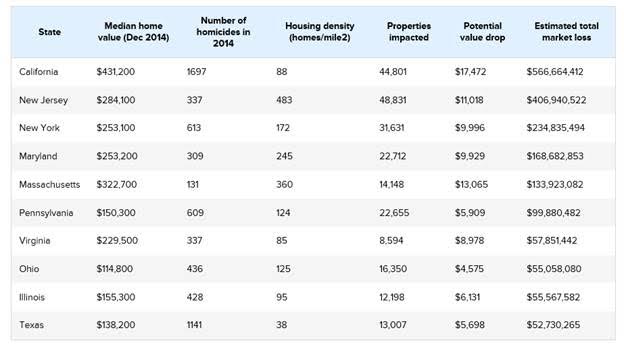 Homicides wipe a whopping $2.3 billion off the U.S. property market every year. Though it's no surprise that a murder on the premises can lower the value of your home, that's still a lot of money going cold every single year.
Homicides wipe a whopping $2.3 billion off the U.S. property market every year. Though it's no surprise that a murder on the premises can lower the value of your home, that's still a lot of money going cold every single year.
Finder.com has calculated the impact of murders on property prices across the United States. To do that, research from the University of Technology Sydney (UTS) was used, which found that home prices generally fall by around 4.4 percent for properties located within 0.2 miles of a homicide location in the year following the murder. That percentage was then applied to the housing market in each state, looking at the number of murders and the typical housing density as of 2014. That helped calculate the typical impact on a property price, as well as the overall impact in each state.
Which states have been hit the hardest?
These are the 10 states that saw the biggest impact due to homicide. California tops the list (it also has the highest number of homicides), while the high-density housing market in New Jersey took second place.
Not only are people creeped out by the thought that someone has been killed, a murder creates a perception that the area is generally less safe and has a higher crime rate. You can check out the impact across every state in this interactive chart:









I’ve been an SRA and certified appraiser since ’89, not certain how many thousands of reports I’ve done. Been in the Atlanta area since ’94 so many thousands have been completed here – most as a FNMA foreclosure appraiser during the crash years and that means rough areas as Atlanta crashed especially hard. I say that because I’m calling this report unsupportable.
Violent crime impacts a home and areas with high crime rates are also impacted. So too are areas with poor schools, high unemployment, poorly managed areas, areas with high vacancy rates….it’s not really possible to state that “murder” results in a loss of X.
The idea that one variable ca be isolated like this is as misleading as a Case Shiller or other nation report on prices. Is murder bad? Yes. But there are always other factors at play as well.
I have also been an appraiser for over 15 years and I would agree with Hank Miller. As time go on, unless a home is really in a high crime rate area and a family or two have lived in the home, I think the fear perception would slowing disappear. Is it the potential of ghosts that so many women are afraid/creeped out over? I understand more women go to church by about 4 to 1 vs. men. I know I’m not being politically/socially correct and few authors would even have the guts to write such an article but I bet the stats would show that it is women who most often kill the deals when such issues occur and no amount of logic will get them to change their mind. Of course not all men and women are like this and thus you would also have to know the percentage of men and women who believe in ghosts. Many men go along with women because of the happy wife happy life scenario so the strength of the man’s psychological persuasion and the women’s emotional strength could also play a role.
High Crime rate areas are usually those of lower socio-economic areas and thus the lower values are already factored in.
I would have to believe that the chances of being murdered in a home that had a previous murder would even have a higher improbability than a home that had no murders or suicides. Florida has had some law changes on disclosure that I thought were interesting. Whether murder, suicide, accident of illness, the chances of someone having dying while in their home is probably relatively high.
My point is we need to get over this fear. There are no ghosts and those that claim to be able to perceive them are full of it, often times trying to make a buck off the situation; scam artists. There are no real ghost busters and those that try it are being funded by Hollywood.
I agree with Hanks comments. In the state of Pennsylvania murders and suicides do not have to be disclosed. Can it stigmatize a home if it is well publicized, perhaps. So I find it very difficult that someone can place a cost/loss on a property where a crime has occurred. Location has always played a key role in pricing and I would strongly suspect that prices are deflated in higher crime areas. This is typically public information that buyers review prior to a purchase.